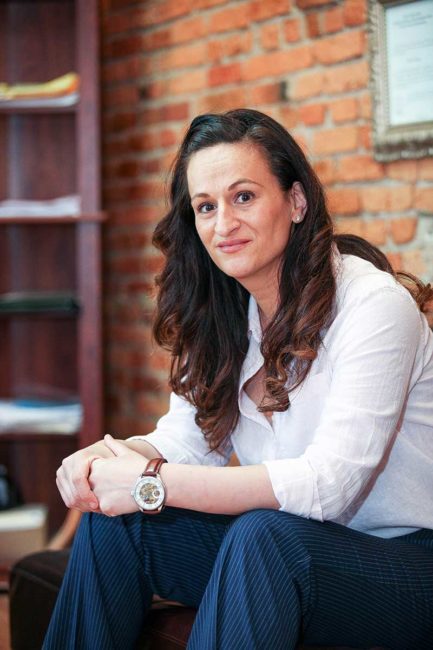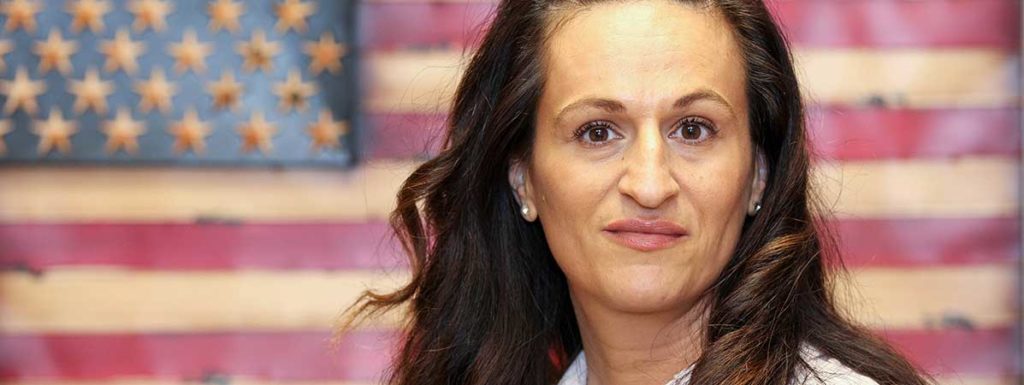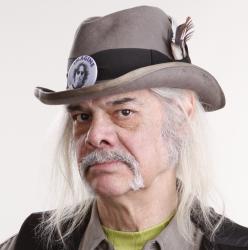If the current media-hyped wave — the focused nomination of women for political office — is real, it may be a generational as well as a genderal phenomenon. Mackenzie Mertikas, victor in the recent election for Syracuse University Student Association president, maintained on the April 1 cover of The Daily Orange campus newspaper, “SU as a whole lacks female representation and in many areas is controlled by white men.”
Mertikas hopes that her example will be empowering for other women. For the wave to crest, however, role models will need to emerge providing examples beyond the ballot box.
If the wave is real, its current will be guided by a crew of new faces, among them Shadia Tadros, 37, a first-generation Arab-American native of the city’s South Side, whose father worked as a security guard and her grandfather owned a store. Her family emigrated from Jordan looking for a better life.
Tadros’ introduction to electoral politics resulted in a razor-thin 124-vote loss in last year’s Democratic Party primary for City Court judge. “I am not a politician,” she campaigned, “I do not come from money or establishment. I’m a city kid who went to city schools (Danforth, Clary and Corcoran). I know the community. We have to be judged by one of our own, no more insiders, and no more rhetoric.”
Tadros continued her education with a bachelor’s from C.W. Post and a law degree and master’s at Penn State. She has volunteered at the Rescue Mission and the Samaritan Center, and has been awarded the Pro Bono Champion of the Year award by the Onondaga County Volunteer Lawyers Project. She is an attorney for the Tadros Law Office, P.C., 103 E. Water St.

Your campaign flyer said that you’re a city girl. Tell us about this city and what it means to be a girl growing up.
Well, I would say I am a city girl because I was born and raised in the city, and I currently live in the city. I represent city folks, but Syracuse has its own culture and it has its own city landscape and it’s determined by where you grow up, how you grow up, those types of things.
When I say I am a city girl, other city folks understand exactly what that means. It’s just letting people know that I have an appreciation for the city of Syracuse, that I was raised in an urban lifestyle, that I went to city schools, so I was around city folks. I actually think city schools are a microcosm of the city itself, so that makes such a big difference of whether you went to city schools or not because it’s whether or not you were exposed to all of the different city folks.
Is it different for a city boy?
My experience is a little more specific because I am an Arab-American girl, and so that changes the dynamic quite a bit. Being a city girl is one thing and traversing the different avenues of the city as just a city kid vs. then going home to an Arab household where we have our own culture and we have own separate way of doing things — our own language, our own traditions — and navigating that.
So from a certain time period you’re in one world, and then you’re open to another part of the world. But I say I am a city kid because my experience was being from an Arab-American household, but for other folks their household was specific as well. So they grew up in a certain household: maybe one parent, maybe two parents, maybe they themselves are immigrant kids, maybe they had family health issues. There are all types of different issues. And that’s what it is being a city kid: You have your own world and then that Venn diagram opens up a little bit and then you include the Syracuse city part of it.
Your campaign flyer said “I get it.” What did you get? How hard was it? And how did it happen?
Saying “I get it” means I understand exactly where people are coming from, so I understand the struggles and issues that regular people get. Regular city people struggling day to day, working hard to figure out where they fit in, how that translates, that’s what I get. I get that life is hard enough without adding extra obstacles and challenges.
Joe Biden is talking about how “he gets it.” Do you think it’s cultural?
Well, I disagree with Joe Biden a little bit because when I say I get it, I get that people are fed up, that they are over these fake divides, they are over politics, they are over promises. So I get it that not only have things changed but they haven’t changed enough.
What Joe Biden doesn’t get is that things have changed but they have to continue changing and the narrative has to continue changing. It’s not enough now to even say you understand, but if you understand now, you are obliged to carry that mantel forward.
So when I say “I get it,” I am promising to fight for change, I am going to fight for transformation, I am going to fight for everything that needs to be done. It’s not that pandering of “I get it, things have changed, I did wrong 20 years ago” like Joe Biden is saying, “Yeah, now I see. I get it, I understand what you folks are talking about.” Women have to fight their entire lives to not only be equal but to be safe from unwanted touching, unwanted attention, unwanted affection. Not only was he complacent in that, but he was actually the one making people uncomfortable, so I don’t know if he gets that.
Of course, I am weary about forcing new standards on old standards and all of that understanding that things have changed. And that’s the whole thing about moving forward. It’s progress, so the whole progressive movement is progress.
Is it a wave (specifically the female political candidates running for office)?
I think we have to go a little deeper than that because people talk about the old boy’s network and think of old white men. But that’s not necessarily the case; there has been old white women, there has been young black people that are establishment, there has been Arabs that are also the establishment. What we want is urban progressive ideals pushed forward. So if that is carried by a white man, I have no problem with that; if it’s carried by a woman, I have no problem with that.
But I think people have just had enough. I think that women, particularly women of color, have had enough and are deciding to take things into their own hands. I always thought the future is female and the future is minority women.

Your flyer seemed to reflect that you were running for office because of the way people are getting treated in the jails. What brought that on?
I think what excited so many people about my campaign was that it was the first time a judicial candidate or someone within the criminal justice realm was actually talking about issues and actually pushing for change. A lot of judicial candidates hide behind the judicial speech restrictions, but it’s simply not true. So we had our platform approved by judicial ethics before I decided to run. Because if I couldn’t talk about the issues, I wasn’t running.
My campaign was always issue-specific and we talked about Syracuse and the different neighborhoods and the different sections. You have one section of the city that has been affected by the criminal justice system, has been wronged by the criminal justice system, and is continuing to be wronged by the criminal justice system. There are stark statistics of what is going on locally in Syracuse and in local jails. And then you have another section of Syracuse that had no idea what was going on. The beauty of it is that section was outraged about what was going on to other city folks.
People thought that my message would only ring true in certain neighborhoods of certain demographics, and it’s not true. I actually did very well in middle-class households and working-class households, I did very well with non-minorities as well as doing well with minorities and the working class and the folks from where I grew up.
So it’s about bringing the issues forward, it was about educating folks and getting other people to start speaking on these issues. That was a point of the campaign, and I think we did a wonderful job doing it.
One focus of your campaign was that we need to have no more insiders, we need to be judged by one of our own. Can you expand on that?
Just like any institution, the political institution is always a power grab. I have a friend that says Syracuse has had a permanent political class. So there are a whole group of people that have been entitled or think they are entitled to being the governing class of the city.
That’s just the way it is and people allow it. For too long people have allowed it and they bought into this narrative of “Oh, you’re from such and such” or “You know this or you know that.” Local politics is almost like a hazing activity: You have to come in and you have to do what they tell you that you have to do, or not only will they not support you but they will intentionally and purposely obstruct you. And it has nothing to do with issues or values or any of that, it has to do with you are not going to use their power from the structure and we will decide how much power you have.
So it’s a structure I wouldn’t play. There are a whole bunch of new people that just won’t play the game. There is no reason for it.
And it’s not just Irish and Italian, it is a generational thing because there are minorities that are also part of this establishment class that are also doing everything in its power to shut out some of the new folks, too. Let’s be very clear: I don’t want people to think it’s this old white man that’s keeping everyone down. There are minorities locally as well that add to the problem of who gets to do what in the local parties. Power is a hard thing to give up.
It’s just institutional. There are still parts of town that are still Irish, still Italian, a lot of it still has to do with the name or who they appoint to be in what position. They may appoint a minority or they may do whatever, but it’s still the same power structure, it’s still the same political class.
Will you be using this opportunity to announce you are part of the next wave election?
I was already part of the wave. And truthfully, I don’t like the word “wave” because that makes it seem like we’re all working in tandem, and we’re not. What you have is a whole bunch of folks that have individually had enough. But our message resonates with a lot more people than anyone ever thought. I’ve always been a proud progressive candidate; I’ve claimed it since the beginning, I was endorsed by progressive organizations.
A lot of the issues I was bringing up were considered progressive issues, even though we know now that criminal justice reform is happening at different levels. A bunch of the candidates had no idea what was going on. In the beginning, everyone looked at me, mouths open: “What is she saying?” I was actually accosted by a local politician that told me I was making up the statistics to fit my narrative. Not only did I properly educate her, but I used that as a teaching moment to educate everyone else of “we don’t have many numbers, but the numbers we do have are stark,” and it’s very clear what is going on locally.
I think with the progressive movement, a lot of our narrative is positive. Even with the numbers of 64% locally of people being housed in jail are pretrial and have not been convicted yet. I just put up on my Facebook page about the violations of probation for misdemeanor offenses.
Onondaga is the most jailing county for misdemeanor violations; I believe it’s three to five times higher than New York City. A lot of people think Syracuse is this liberal city, when it really isn’t. Some of the town and village judges in Onondaga County are actually more liberal than some of our city court judges, because we have centralized arraignment now; some people have better luck with the village justices than they do with our own city judges.
The progressive movement is all about change is possible, and change is coming, as long as everyone takes part in it. I can tell you right now that a lot of people who worked on my campaign are now themselves running for office and carrying the torch forward.
You know, politics is very clear: Where do we get the vote? Here’s who we focus on, and here is who we ignore; it takes a lot of people for granted. If we are a Democrat in the city, we get the black vote, we don’t even need to work for it, they’ll just come along. So what my campaign did was “I’ll reach out to everyone, I will focus on the people who have been taken for granted, while at the same time bringing in a whole new group of people that have been so turned off by politics.” Maybe they’ve gone through the system, too, and they’re angry at it, and now the only thing they can do is try to vote for change. That’s what the progressive movement is: Bring ALL types of people together.
Will you bring that together in the next election and run for office?
I’m already doing that in this election by supporting other people that are running for office with those same ideals. I ran for office to push an agenda of change and criminal justice reform. So whatever avenue is best to do that, that’s what I’ll do.



